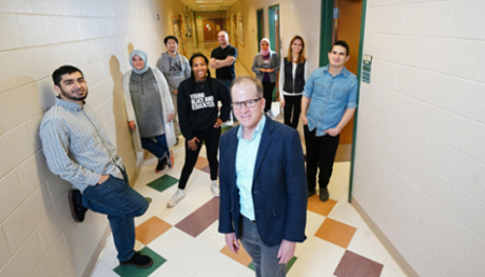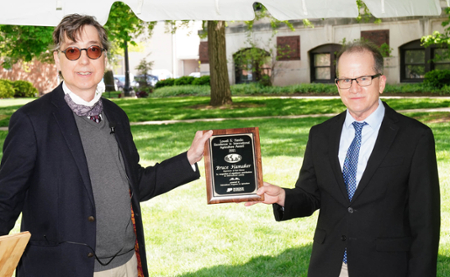Awards highlight Hamaker’s practical and impactful research
“I’m very happy to be working in agriculture,” Bruce Hamaker, director of the Whistler Center for Carbohydrate Research and distinguished professor of food science, said. “It’s become my life.”
Before finding his profession and passion in agriculture and carbohydrate research, Hamaker pursued a number of different paths, which included nutritional sciences, dental school and two years in Liberia with the Peace Corps. Despite growing up in Indiana, Hamaker didn’t have any strong ties to agriculture or food production. He began a graduate degree in nutritional science at Purdue with the intention of applying it towards a career in international development. Quickly, however, Hamaker became captivated by food chemistry and the molecular makeup of carbohydrates.
Hamaker’s research also intersects with his earlier interests in international development and human health and nutrition. Recently, Hamaker received two awards acknowledging the impact of his work at home and abroad.
For his commitment to the pillars of the land-grant university, education, extension and research, Hamaker received the 2020 Corinne Alexander Spirit of the Land Grant Mission Award. The 2021 Lowell S. Hardin Award for Excellence in International Agriculture was also awarded to Hamaker for his collaboration with entrepreneurs and food processors in West Africa.
“Dr. Hamaker is an extraordinary researcher who oversees a globally recognized lab in carbohydrate chemistry and nutrition that generates a substantial number of peer-reviewed publications and trains highly sought-after graduate students,” Senay Simsek, who will begin as department head of food science July 1, said. “He demonstrates leadership, not just at the university level but nationally and internationally.”
Hamaker explains the research conducted in his lab is basic. Not basic as in rudimentary, but basic as in down to foundational, molecular levels.
“We do studies of the upper gastrointestinal (GI) tract. We conduct research in the lab, with animals and even with human test subjects,” Hamaker explained. “What we’ve found is that there is a way to digest carbohydrates that activates a system that tells your brain you’re satiated." This comes down to how the carbohydrate is structured, compounds found in food and where carbohydrates fit into the matrix of a given diet.

Lab in the Department of Food Science,
Whistler Carbohydrate Center,
photo by Tom Campbell.

of Purdue University’s Office of International
Programs in Agriculture, presents
the Hardin Award to Hamaker.
Hamaker also works with the microbiome, located in the lower part of the GI tract.
“It’s a complicated world down there, but what we are trying to figure out is how fibers that bacteria use, what we call prebiotics, can be aligned to certain beneficial bacteria,” he added.
This work has commercial implications for major food processors in the U.S., and applications to smallholder farmers and entrepreneurs in developing nations. Hamaker is pursuing both opportunities to share his findings.
Understanding how to make carbohydrates healthier and more filling could revolutionize nearly every facet of the food chain and eliminate the stigma around carbohydrates.
Gerald Shively, associate dean and director of Purdue University’s Office of International Programs in Agriculture, presents the Hardin Award to Hamaker.
“For my generation, carbs have been a hot button issue,” he added. “We’re always hearing about low-carb, carb-free and so on. People assume carbohydrates aren’t a good way to get calories. That may be correct for most of the carbohydrates on the market, but it doesn’t have to be that way.”
Hamaker’s hope is that through communication and, perhaps, starting his own company, the results of his lab’s research will begin to correct misconceptions about carbohydrates and also change standard food processing procedures to create healthier, more complex carbohydrates for consumers.
“Big companies are not likely to invest in this kind of research, which is why we need to find good ways to communicate our results to the public and to industry,” Hamaker continued. “It’s hard to change public opinion, and it’s even more difficult to change scientific opinion to cause a paradigm shift.”
While some paradigms may be slow to shift, others move at breakneck speeds.
Hamaker learned this in West Africa where he works with partners and research collaborators to support food entrepreneurs in both urban and rural locations. By providing technological support and training, these entrepreneurs, mostly women, are able to produce and process nutritious food that sells on the market at a premium. Enthusiastic participants have trained other women in neighboring villages.
“In Niger, we worked with a group of women who trained many other women, some of them in villages 20 kilometers away, in ways of processing simple, high quality goods,” Hamaker said. “It made me realize really what it means to empower women in developing countries. They spend the money they earn on their families and their community. When they have knowledge, they share it. They realize that knowledge is powerful.”
And that, Hamaker said, is a perfect illustration of why he was drawn into the discipline of food science.
“Food science is an applied science at its core,” he continued. “Our big intention is to do research that is practical and impactful.”





